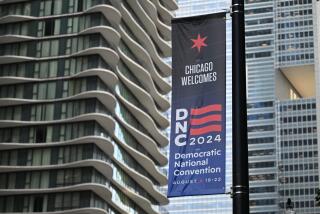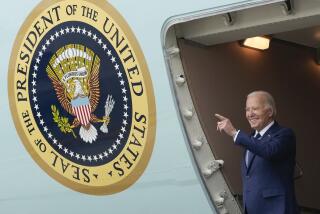New Democrat Leader Assails Party Caucuses
WASHINGTON — Paul G. Kirk Jr., the new Democratic national chairman, Sunday denounced the party’s special-interest caucus system as “political nonsense” and predicted that it will collapse under its own weight during the next year or so because “people will have a greater voice in the party.”
“We’ve operated now for too long on the politics of separation by defining ourselves in different special categories,” said Kirk, a former aide to Sen. Edward M. Kennedy (D-Mass.) who was elected Friday to the party’s top post. “This party’s diversity should be its strength and not its weakness.”
The Democratic National Committee includes among its membership at least seven official caucuses: black, Latino, women, business and professional, homosexual, Asian-Pacific and liberal-progressive. And, for the most part, the caucuses--which largely represent disadvantaged groups--have had a strong voice on the party’s highest counsels, although they are officially only advisory bodies.
But critics contend that the caucuses play a divisive role in party politics and alienate many voters who otherwise would be sympathetic to Democratic causes.
May Provoke Dispute
Kirk’s outspoken criticism of the caucus system so soon after being elected chairman is likely to provoke a prolonged dispute among Democratic activists. And the outcome could have far-reaching consequences for the beleaguered party.
“I think the caucus system . . . is political nonsense in my view,” Kirk said in an interview on NBC-TV’s “Meet the Press.” “And I think, during the course of the next year or so, you’ll find that the caucuses . . . will fall of their own weight because people will have a greater voice in the party.”
Kirk said that the Democrats cannot succeed in creating a new national image if “we get caught on the very kind of specific, narrow questions” engendered by the caucus system.
He denied, however, that his decision not to abide by the recommendation of the Black Caucus and select Mayor Richard G. Hatcher of Gary, Ind., for another term as party vice chairman was a signal that he was about to break the hold of the caucuses.
On other matters, Kirk said that fairness remains the “fundamental bottom line” of the party and that Democrats in Congress will “make sure that fairness prevails” in considering President Reagan’s proposed $974-billion budget for fiscal 1986.
He rejected suggestions that his election owes a large debt to the backing of organized labor. “When I decided to seek the chairmanship, I also decided that I would run without making any commitments or any promises to the so-called special interests,” he said. “And I did not, and I won.”
More to Read
Get the L.A. Times Politics newsletter
Deeply reported insights into legislation, politics and policy from Sacramento, Washington and beyond. In your inbox three times per week.
You may occasionally receive promotional content from the Los Angeles Times.










